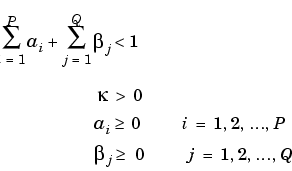

| Financial Toolbox |   |
Univariate GARCH(P,Q) parameter estimation with Gaussian innovations
Syntax
Arguments
Description
[Kappa, Alpha, Beta] = ugarch(U, P, Q)
computes estimated univariate GARCH(P,Q) parameters with Gaussian innovations.
Kappa is the estimated scalar constant term ( ) of the GARCH process.
) of the GARCH process.
Alpha is a P-by-1 vector of estimated coefficients, where P is the number of lags of the conditional variance included in the GARCH process.
Beta is a Q-by-1 vector of estimated coefficients, where Q is the number of lags of the squared innovations included in the GARCH process.
The time-conditional variance,  t2, of a GARCH(P,Q) process is modeled as
t2, of a GARCH(P,Q) process is modeled as

where  represents the argument
represents the argument Alpha,  represents
represents Beta, and the GARCH(P, Q) coefficients { ,
,  ,
,  } are subject to the following constraints.
} are subject to the following constraints.

Note that U is a vector of residuals or innovations ( t) of an econometric model, representing a mean-zero, discrete-time stochastic process.
t) of an econometric model, representing a mean-zero, discrete-time stochastic process.
Although  t2 is generated using the equation above,
t2 is generated using the equation above,  t and
t and  t2 are related as
t2 are related as

where {vt} is an independent, identically distributed (i.i.d.) sequence ~ N(0,1).
Note
ugarch corresponds generally to the GARCH Toolbox function garchfit. The GARCH Toolbox provides a comprehensive and integrated computing environment for the analysis of volatility in time series. For information, see the GARCH Toolbox User's Guide or the financial products Web page at http://www.mathworks.com/products/finprod/.
|
Examples
See ugarchsim for an example of a GARCH(P,Q) process.
See Also
ugarchpred, ugarchsim, and the GARCH Toolbox function garchfit
References
James D. Hamilton, Time Series Analysis, Princeton University Press, 1994
 | tr2bonds | ugarchllf |  |